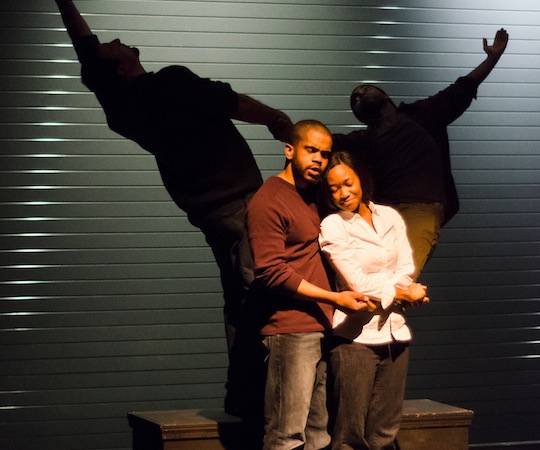Advertisement
Company One And ArtsEmerson Go To Namibia, With Style

BOSTON — The media may rarely show any interest in Africa these days, but local theaters sure are trying to fill the void, particularly in terms of colonialism’s horrible effects on the continent. Last year saw the great “Mies Julie,” set in South Africa from ArtsEmerson. Next month Chelsea’s Apollinaire Theatre Company will host the US premiere of “Peggy Pickit Sees the Face of God” by Roland Schimmelpfennig, set in an unnamed African country and dealing with the West’s involvement in the African AIDS crisis.
No need to wait, though, as ArtsEmerson is back with another fine production, this time a collaboration with the impressive local troupe, Company One, in the Paramount Center's Black Box theater (through Feb. 1). It’s Jackie Sibblies Drury’s – take a deep breath — “We Are Proud to Present a Presentation About the Herero of Namibia, Formerly Known as Southwest Africa, From the German Sudwestafrika, Between the Years 1884-1915.”
Say what? If the title sounds a little playful, so is Drury’s work, though the implications are dead serious. Drury started out writing a more traditional play. She had Googled “black people” and “Africa” and discovered that before Hitler and friends had devised the Holocaust another group of good Germans had committed the first genocide of the century in Namibia.
She wrote what she describes as a not very good play and so she went back to the drawing board. Or the rehearsal room, where the new, presumably improved play is set. Three young black and three young white American actors start out bouncing about and acting silly as the audience enters. Some are seated in the audience, others are doing warmup exercises.
As they slowly get down to business, they debate how best to tackle the issue of genocide in Namibia. The entire written record seems to be from letters written home from German soldiers stationed in southwest Africa around the turn of the century. The white actors, two men and a woman, start acting out those letters before one of the black actors wonders, “What about the Africans”?
Thus begins the drama within the drama, though a pair of disarming dramas with a light – and deft – touch. On one level the play seems like a satire of acting, particularly the psychodramas of rehearsal rooms with weird exercises, getting into character, finding motivation, and the sexual and political sub-dramas going on in the room.
On a more serious level, although it’s arrived at on an angle, is the story of the little-known historical tragedy that the history books don’t tell us about. It’s a smaller-scale holocaust, of course, but no less tragic for the dead or for those whose ancestry was almost wiped clean.
All this converges in what seems to be the main theme — that while most people think they can see politics and history from an objective standpoint, we all bring our subjective stories to the table. Thus the white actors are intrigued by the German soldiers while the black actors grow increasingly restless about the focus.
The subject matter and the casting is a continuation of the laudable mission of Company One in terms of opening the theater to diversity. Everybody talks the talk, but Company One walks the walk. The fine ensemble is a delight to watch as the sextet ranges from the silly to the slightly sexual, from the historical anger of whites and blacks alike to the contemporaneous realization that, even among friends, it’s difficult to find a common language about race.
Director Summer Williams does an excellent job of maintaining the focus while allowing the action to stretch out in a bigger space than she usually gets to work in at the Boston Center for the Arts. It’s among the best work that she and Company One have done and that’s saying something. (Next up for them is “The Flick” in late February by Annie Baker, the superb playwright Company One championed a few years ago in a memorable collaboration with the Huntington and SpeakEasy.)

The cast of “We Are Proud …” leaves little to be desired, but first among equals in the impressive local ensemble is Elle Borders as Williams’ stand-in of sorts, the director who’s trying to keep everything in order among the cast. Whether she’s the naïve goody-goody negotiator at the beginning or the thoroughly assertive director later in the play, she is note perfect. The program says the production marks her return to the Boston theater community. I can’t wait to see more of her.
“We Are Proud” is not a type of theater that everyone is comfortable with, as it seems somewhat improvisational and indirect and it seeks a nontraditional relationship with the audience. (Don’t worry, no one’s dragged into the proceedings.)
It can be a mistake to review the audience, but it seems somewhat inevitable here the way that everyone is facing each other as the actors wade through the aisles. So it should be said that the younger audience members seemed thoroughly at home with the irony, odd humor and meta-theatricality of the play; the older members less so.
But don’t let that deter you if you’re up there. If you’re a fan of ArtsEmerson or Company One, you’ll be an even bigger one after this.

